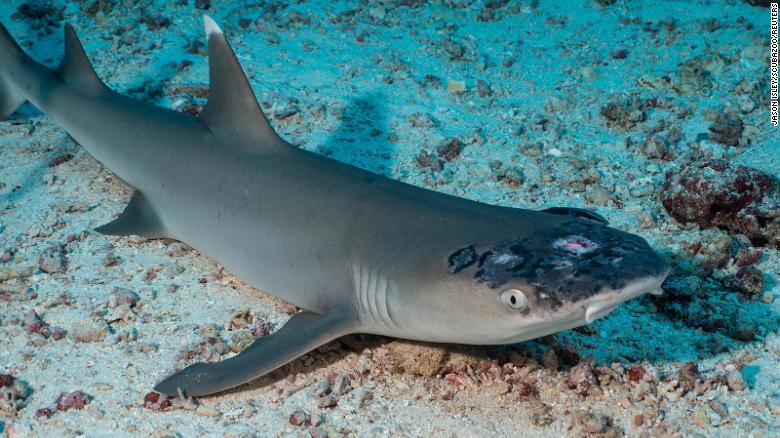A whitetip reef shark with white spots and lesions is found on the seafloor off the coast of Sipadan Island, Malaysia.
(Reuters) -
Marine biologists are investigating a mysterious skin disease affecting whitetip reef sharks in Malaysia.
Some initial reports suggest that rising sea temperatures could be the culprit.
Whitetip reef sharks, named for the distinctive white tips on their fins, are commonly found lounging on shoals around reefs during the day and are a popular attraction for divers.
They are activated at night to hunt small fish and other animals.
Images of one of the sharks with what appeared to be spots and head injuries went viral on social media in April after being taken by an underwater photographer in the state of Sabah, on the island of Borneo.
Shark and ray populations have fallen by 70% and are approaching a "point of no return", warns a study
Soon after, divers on Sipadan Island, a famous nearby dive destination, and a team of experts from the state university and government and conservation groups began to see skin disease in every group of sharks they encountered.
Rise in temperature and global warming
In trying to diagnose what might be causing the disease, the team found that the sea surface temperature in Sipadan had risen to 29.5 degrees Celsius in May, one degree higher than in 1985.
advertising
"We can almost certainly identify ocean warming as a role in what we're seeing with sickly sharks in Sipadan," said Davies Austin Spiji, a senior marine biologist with the non-profit conservation group Reef Guardian, ruling out human factors. since Sipadan is a protected marine area where fishing is strictly prohibited, and there are no settlements or industries nearby.
The reported sightings coincide with reports of coral bleaching in the area, according to Mohamed Shariff Mohamed Din, professor of Aquatic Veterinary Studies at Universiti Putra Malaysia.
"We cannot ignore that changes are taking place there due to the higher temperatures," said Mohamed Shariff.
However, a full scientific study has yet to be done.
In May, the research team tried, but failed to capture some of the sharks to obtain samples for testing, said Mabel Manjaji-Matsumoto, a senior professor at the Borneo Marine Research Institute of the Universiti Malaysia Sabah.
"If we can get samples from sharks, surely we can at least discover the pathogenic cause of the lesions," Manjaji-Matsumoto said, adding that the team plans to make another attempt in July.
Global warmingSharks







